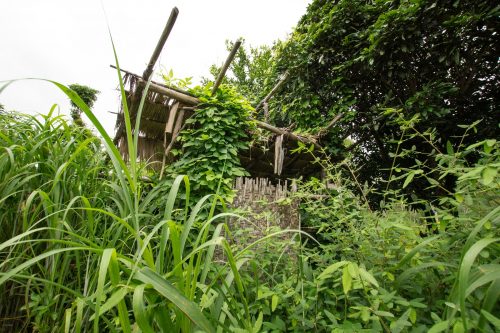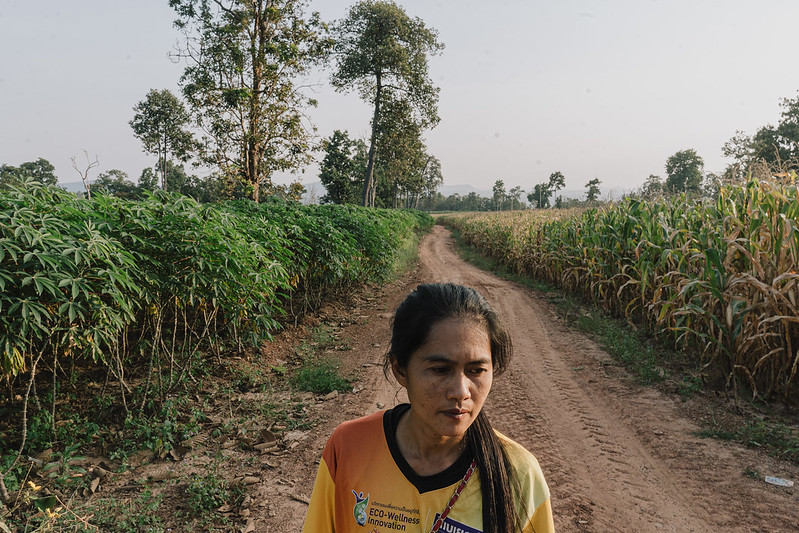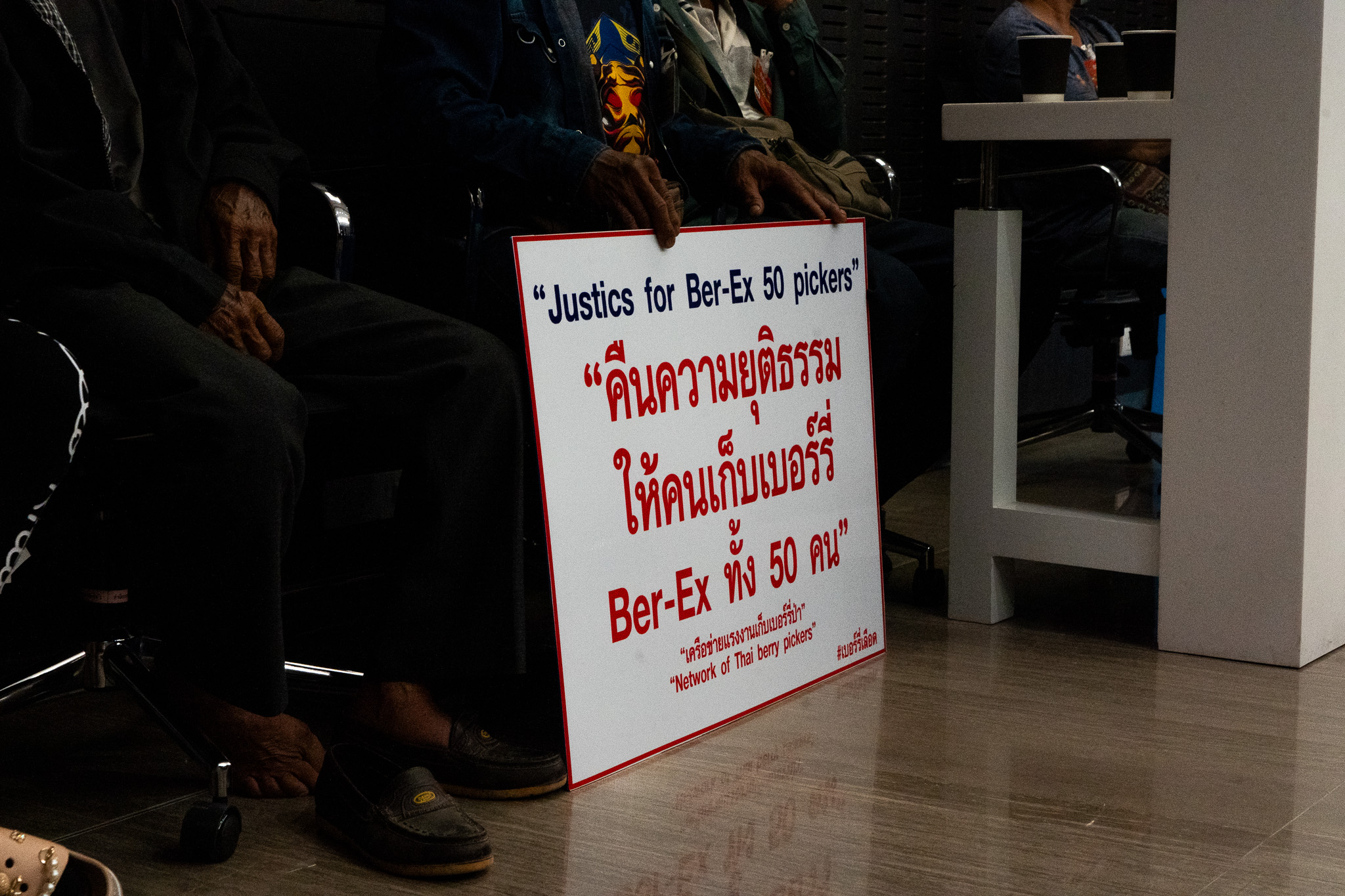A land rights activist whose husband was disappeared last year is serving a six-month sentence in prison for resisting the military junta’s reforestation policy. Despite continued community organization, her fellow community members continue to dwindle, fearing they may end up in her place.
Guest contribution by Laura Isaza
Photographs by Kyler Carlson

PHU KHIEW DISTRICT PRISON, CHAIYAPHUM — Suphap Khamlae enters the visitation room followed by another woman in blue, who watches her every move. Suphap sits down, looking straight through the bars and glass. The other woman, a prisoner assigned to monitor Suphap, sits a couple of feet behind. As Suphap picks up the phone, a prison guard puts on a pair of headphones.
Suphap, 62, maintains a calm demeanor as she talks about her life in prison. She assures us that she has many friends. As work she fashions artificial flowers. Prison life, she says, is “just fine.”
For several decades, Suphap lived in her home in Khok Yao Village in Chaiyaphum Province , caring for her dogs and collecting mushrooms. Now she sits behind the bars, deemed a major threat to forest conservation by the government.
Her face only drops when she talks about her two dogs. “I miss them,” she says on the brink of tears.
To keep her spirits up, her friends visit Suphap three times each week. One visitor she will not see throughout her six-month sentence is her husband, Den, a prominent activist for land rights.
Last year, Den set out one morning to collect mushrooms. That evening, only the dogs returned. Neighbors reported having heard gunshots.
After a year of searching in the forest, community members found Den’s bodily remains earlier this year.
With the loss of her husband, her home, and her right to peacefully exist, she chokes up at the thought of her dogs, the only living connection to everything she’s struggled for — and now lost.
Government policies to unpeople forests
Suphap’s case is among a series of imprisonments surrounding the right to exist on state forest land. The number of forest villagers continues to dwindle. Their resistance faces persistent and harsh retaliation.
Since the 1960s, Thai policies have defined national parks and forests as free of people. Since 2014, a government plan to expand the country’s forested areas to 40 percent have displaced hundreds of villagers.
In June 2014, the National Council for Peace and Order (NCPO) issued Order 64/2014 which aims to remove those who encroach on national forest reserves.
A few days later, the junta issued Order 66/2014, which states that Order 64 must not affect the poor living on protected lands. Instead, it targets investors. But the term “investors” has been loosely defined. Under Order 66, anyone using 50 rai (8 hectares) of land qualifies as an investor.
But some villagers have been prosecuted for using half of that. Meanwhile, in Krabi Province, a prominent figure was recently granted the right over an entire island within Hat Noppharat Thara-Mu Ko Phi Phi National Park.
Order 66, supposedly designed to protect the landless poor, has in turn been used to evict and convict them. Others, like Suphap’s husband Den, have met far worse fates.
A defiant citizen disappears
On the morning of April 16, 2016, Suphap gave her husband Den Khamlae a bag of sticky rice before he set out into the forest with their two dogs. That night one of the dogs returned, mangled and bloody.
There was no sign of Den.
Villagers reported they heard gunshots. After months of fruitless searching, Den’s clothes were found, confirming Suphap’s biggest fear: her husband was dead.
Den had been an outspoken activist for his community in Khok Yao Village and the protection of land rights in Thailand. Partnering with the Isaan Land Reform Network (ILRN), Den channeled his community’s concerns into policy proposals to the government. He participated in events aimed at increasing awareness and solidarity for Khok Yao and broader land reform movements throughout Thailand.
At the 7th Annual Isaan Human Rights Festival in December 2014, the then-new military government prohibited event organizers from criticizing the NCPO. Event organizers scrambled to mute out criticisms in videos to be shown at the event. The audience watched, confused when a short documentary on the evictions of forest villages became almost a silent film.
When it ended, Den stood up and spoke, relaying the messages that had been cut out from the film. Though Den was an event participant, not an organizer, his words defied military wishes.
Despite arrests, forced relocations, and eviction notices, Den and Suphap stayed in their Khok Yao home. The couple refused to submit to threats and harsh treatment and concede to what the government most demanded of them: silence.
Widow continues land rights movement
Den’s disappearance last year did neither intimidate Suphap into leaving her village nor did it stop the movement for villagers’ land rights.
“At that point I had to continue doing what he was doing,” Suphap says, “even if that involves going to prison.”

Suphap Khamlae’s house and one of its remaining residents. Her two dogs were once fierce. Since they returned on the night of her husband Den’s disappearance, their ears torn, they have been timid of everyone. In the couple’s absence, community members help maintain the house.
Suphap’s six-month prison sentence came as a surprise to her and many of her supporters who expected nothing more than probation. According to them, past legal precedent suggested that probation would have been the maximum sentence.
Pun Kunrahong recounted the day she learned of her sentencing of her friend, Suphap. “Tears were streaming down my face,” she says. “I was so sad. Even though she is not my real sister, she has been like a true sister to me.”
Samniang Kongtui, a former Khok Yao resident, had warned Suphap about the risks of resisting the government. “I would tell her to stop because she goes up against people with power, and she would just laugh,” she remembers.
But Samniang knew what she was talking about: She had already been imprisoned once.
A “normal” prison life
A former land rights activist from Khok Yao, Samniang is familiar with life in Chaiyaphum Provincial Prison where she spent three months in 2012. Like Suphap, she was charged for encroaching on public lands.

“I was raising cows in the village even before those military people were born,” says 68-year-old Samniang Kongtui, a former land rights activist from Khok Yao village.
“The government told me that I was living in Khok Yao illegally,” the 68-year-old says. “I don’t think I was doing wrong. I had been living there before the land was declared forest land.”
Since her release, Samniang has not returned to Khok Yao. “I miss my time there and my cows,” she says. Yet she vows never to return. “I would not go back. Even if the Forest Officers [charged with protecting National Park grounds] were to say that I could live there.”
What she most fears is the threat of arrest. “I am already old and I never want to see that prison again. I had to go through eight gates to exit that prison, and I’ve never looked back.”
Samniang says life inside prison was “normal.” But Pramote Pholpinyo, head of the Isaan Land Reform Network (ILRN), who is familiar with cases of imprisonment of Khok Yao residents, notes that “of course nobody wants to be there. They are never actually fine.”
For activists like Samniang, the risk of fighting for land rights has become too great. After ten years of partnership with the ILRN, she has decided to stop struggling for a cause she sees as lost.
“I never even considered having power. I can’t imagine what that would be like,” she says. “I don’t think we have any power to fight back with them.” She now lives a quiet life raising fish with her husband.

The overgrown house in which Samiang Kontui lived for 52 years. Having served a three-month sentence, Samniang vows never to go back to her Khok Yao home again.
Solutions from the past: community land titles
In October 2009, the government passed the Community Land Titles Cabinet Decree. The decree grants community land titles (CLT) to Thailand’s landless poor. Under this law a community comprised of members without legal land deeds can apply for a community land title and live on state-owned lands
To acquire a CLT deed, a community must put together a land management proposal with the help of provincial office representatives. Once approved, the community won’t own the land. The land title would have to be renewed periodically, not unlike a lease.
But landowning government agencies are not required to recognize CLTs granted by the government. Addressing this problem, the Cabinet drafted a memorandum of understanding (MOU). Signatories to the MOU agreed to recognize CLTs granted by the central government.
By January 2012, the government had approved 55 out of 435 CLT applications. But only two communities actually were granted recognition by the local government agency responsible for that land.
Since the 2014 coup, there has been no progress on a national policy that might accommodate forest residents. The ILRN has been learning to navigate the political climate since 2014 by focusing on protecting their members and maintaining morale, Pramote says.
Keeping morale for the movement strong has been somewhat of a challenge. “The military did their research from the previous coup. This time they made sure to take control of everything, starting on a political level,” says Pramote.
The conditions of Suphap’s imprisonment reflect this political climate. From her chair in the visitation room, she confirms that the woman in blue, sitting behind her, has been assigned to monitor her. In response to a question about advice she has for women facing similar situations, she says that some things are “difficult to put into words.”
“There’s never been a situation with monitoring like this,” Pramote says about the monitoring of Suphap in prison, “but sometimes visitors have been questioned, had their photos taken, or license plates recorded.”
Apart from taking care of Suphap, the ILRN has been working with villagers to come up with their own land-management strategy through a community land title. Despite government inaction on CLTs, the ILRN hopes it will eventually find success.

Khok Yao eviction notices were first posted by the Royal Forest Department in August 2014. Additional notices have since been placed on every home in the village.
Khok Yao today
Eviction notices hang from every home in Khok Yao. Several villagers have relocated, coming back only to work the land during the day if they can’t find work elsewhere. Before, 33 families lived in Khok Yao. The number has now dwindled to 16.
Still others remain. Pun Kunrahong, her husband, and her great grandson are among the 16 families still living in Khok Yao. She and her husband have also endured relocations and arrests over years of struggle.
“I used to be afraid,” she says. “I’m no longer afraid. We’ll die on this land. If they come for us, we will let them kill us. No matter what, my husband and I, we’ll die here on this land.”

Pun Kunrahong, a friend of Suphap Khamlae, is resolute in staying in Khok Yao with her husband and her great-grandson.
With Suphap in prison and families moving out, the village has grown lonely. Pun occasionally sees former neighbors who come back to the village to work for the day. Homes that were once occupied now stand empty, surrounded by overgrown outhouses.
“We’re not sure what will happen to this community anymore,” says Pun.
Nonetheless, faith persists. “We still believe in the people,” says Pramote. “Looking back on our history, it’s always the people’s movements that bring about change.”
Laura Isaza studies International Relations at Georgetown University. Kyler Carlson is concentrating in Urban Studies at Brown University. Both are currently studying about development and globalization issues in Khon Kaen this semester.





